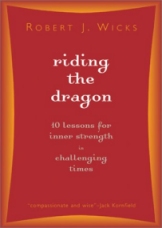
Posted September 21, 2004
Book: Riding the Dragon: 10 Lessons for inner strength in challenging times
|
 |
An excerpt from the Jacket:
The lessons here are drawn from the themes presented by such spiritual guides as Henri Nouwen, Thomas Merton, and Abraham Heschel; from the contributions of eastern thinkers such as David Brazier, Jack Kornfield, Pema Chodron and others; and from Buddist writers such as Sogyal Rinpoche.
The long-lasting results will help all of us enjoy our lives more fully. The lessons will also have healing impact upon those with whom we interact – no small gift in a world presently experiencing such dark times.
An Excerpt from the Book:
For ministers, a theological reflection is a spiritual review of the day. In the process, they too stop at the end of the day to take stock of their lives. This, like the countertransferenial review, helps them to catch the slide into unnecessary darkness and learn from difficult or intense events.
The process of theological reflection, which could be modified according to individual needs, includes the following steps:
– Picking events during the day that stand out
– Entering into the event and describing what happened (the objective) and how we felt (the subjective).
– Avoiding the temptation to be discovered, blame others (projection) or ourselves (self-condemnation); instead, see what we can learn from the event about ourselves and our vulnerabilities, needs, addictions, fears, anxieties, worries, and desires.
– Reflecting on these learnings in light of what we believe (our philosophy, ethics, and/or theology)
– Deciding on how these learnings should change us personally, interpersonally, professionally.
– Changing the way we behave.
In the Buddhist tradition, Zen roshis teach that feelings, past hurts, shame, questions, and needs will come to the surface during meditation. These can teach us if we are willing to pay attention to and refrain from judging, blaming, indulging in, or rejecting our feelings. Instead we must be open to learn from these experiences as we would have others learn from us. In his spiritually rich book A Path With Heart, Jack Kornfield relates this point by way of a story about his teacher:
Spiritual transformation is a profound process that doesn’t happen by accident. We need a repeated discipline, a genuine training, in order to let go of our old habits of mind and to find and sustain a new way of seeing. To mature on the spiritual path we need to commit ourselves in a systematic way. My teacher, Achann Chah, described this commitment as “taking the one seat.” He said, “Just go into the room, open the doors and windows and see who comes to visit. Yhou will witness all kinds of scenes and actors, all kinds of temptations and stories, everything imaginable. Your only job is to stay in your seat. You will see it all arise and pass, and out of this, wisdom and understanding will come.”
Table of Contents:
Lesson 1: Prune carefully ... and often!
Lesson 2. Recognize your renewal zones
Lesson 3. Catch the slide
Lesson 4. Seek hidden possibilities
Lesson 5. Engage the spiritual darkness
Lesson 6. Pair clarity and kindness
Lesson 7. Find love in small deeds
Lesson 8. Seek perspectives daily
Lesson 9. Build a barrier of simplicity
Lesson 10. Come home often
Epilogue: Be a dangerous listner
Some readings I have found helpful